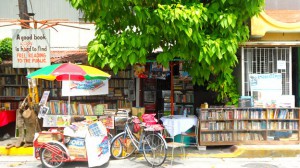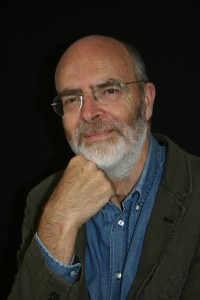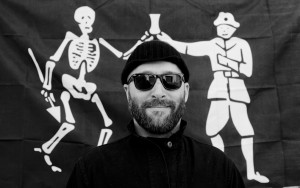
Occupy is dead — the energy and the potential are not.
OCCUPCARDS.COM – Educational Outreach Cards for Activists

Occupy is dead — the energy and the potential are not.
OCCUPCARDS.COM – Educational Outreach Cards for Activists

Further to the comment on Owl's previous post, “displacing the advertising model of book publishers; and those who pay for localized printing will be incentivized to donate the books to their local library….” it may be that the official libraries, too few and limited as they are, will be displaced as well.
The man who turned his home into a public library
By Kate McGeown
BBC News, Manila, 19 September 2012
If you put all the books you own on the street outside your house, you might expect them to disappear in a trice. But one man in Manila tried it – and found that his collection grew.
Hernando Guanlao is a sprightly man in his early 60s, with one abiding passion – books.

They're his pride and joy, which is just as well because, whether he likes it or not, they seem to be taking over his house.
Guanlao, known by his nickname Nanie, has set up an informal library outside his home in central Manila, to encourage his local community to share his joy of reading.
The idea is simple. Readers can take as many books as they want, for as long as they want – even permanently. As Guanlao says: “The only rule is that there are no rules.”
It's a policy you might assume would end very quickly – with Mr Guanlao having no books at all.
But in fact, in the 12 years he's been running his library – or, in his words, his book club – he's found that his collection has grown rather than diminished, as more and more people donate to the cause.

This is going to get into the hands of many more people much more information, and this can't help but have consequences for the “global brain” and all kinds of social activism.
Soon You'll be Able to Go to CVS and Print a Book
Print-on-Demand Books Coming Soon to Thousands of Stores via Espresso Book Machine and Kodak Picture Kiosks
“On Demand Books, the company behind the Espresso Book Machine, and Kodak are partnering to add print-on-demand technology to Kodak Picture Kiosks. That means consumers will be able to print paperback photo books, self-published books and the seven million backlist and public domain titles in On Demand’s catalog from retail chains such as CVS…There are 105,000 Kodak Picture Kiosks globally; you can find them in chains like CVS as well as photography stores, pharmacies and other retail outlets. The partnership with On Demand launches in the U.S. this year and will expand internationally in 2013.”
Phi Beta Iota: Kinko's then FedExOffice experimented with PerfectBind, the same concept, but at the time, not cost effective. Since fiction dominates the book marketplace, rather than non-fiction, the existing client base for CVS and other retail stores is a better target for this offering. At the same time, we anticipate that social media will do a much better job of pointing readers toward worthy reads, displacing the advertising model of book publishers; and those who pay for localized printing will be incentivized to donate the books to their local library. Amazon continues to ignore the human / local factor. Local libraries and local reading clubs could make this take off — group buys of specific books followed by donation to the library.
See Also:
Kodak, On Demand Books and ReaderLink Join Forces for In-Store Book Printing at Retail
Attack on Camp Bastion: The Taliban strike on Camp Bastion in Helmand Province destroyed more than $150 million worth of planes and equipment, Western officials said on 16 September. Military officials said the insurgents destroyed six AV-8B Harrier jets and three refueling stations. Two other Harrier aircraft and six soft-skin aircraft hangars were significantly damaged in the attack.
Comment: An investigation of this security breach is in progress. As with other similar attacks, the success of this attack almost certainly indicates the attackers had extensive intelligence provided by insiders and inside assistance in penetrating the bases at the time of attack
Continue reading “NIGHTWATCH: Afghanistan – One Attack, $150 Million in Losses”

Transforming the Art of Conversation
Conversing as the transformative science of development
Sections:
Variety of conventional conversation challenges
Why converse transformatively?
Imagining an art of transformative conversation
Prefixing “verse” as indication of conversation potential
Transformative conversation in a multiverse
Versification as a key to conversational transformation?
Proposed universes and their conversation potential
Conversation understood through a variety of metaphors
Conversational vehicles: conventional and paradoxical
Transformative conversation in the light of interwoven metaphors
Conversing with “oneself”
Conversation, confidence-building and transformative development
See Also:

The headline quote is a from a participant in the movie!
Saturday, September 15, 2012
Nakoula made a notorious anti-Islam film — yet he had worked for an Islamic terrorist
I ask readers to pay special attention to the Eiad Salameh connection, which nails the theory that Nakoula worked for spooks…
Additional added note: Or does it? I've recently received information that places the Nakoula/Salameh linkage in a new light. The claim that Eiad Salameh is a PLO terrorist comes from his cousin Walid — whom some people (including Chris Hedges) have labeled a serial hoaxer. Walid, like so many of the players in this drama, hails from what we may call the “Pam Geller ring.” His accusations against Hilarion Cappucci — an aged Greek Orthodox cleric — appear to be spurious.
Still, I have received convincing evidence that Eiad is indeed a crook.
If you're confused — well, read what follows, and the context should become clear.

A Jaw-Dropping Explanation of How Governments Are Complicit in the Illegal Drug Trade
The drug war is far, far more than just simply criminals at work, says scholar Oliver Villar.
Note: The following interview helps us understand the drug war from a dramatically different perspective than the one the corporate media paints. Instead the traditional portrayal of the war on drugs as a fight between law enforcement and illicit drug dealers, scholar Oliver Villar explains that the illegal drug trade is a tool of empire a means of “social control” as much as profit. Villar, a lecturer in politics at Charles Sturt University in Bathurst, Australia's insight is well worth the read.
EXTRACT:
LS: Catherine Austin Fitts, a former investment banker from Wall Street, shared this observation once with me:
Essentially, I would say the governments run the drug trade, but they're not the ultimate power, they're just one part, if you will, of managing the operations. Nobody can run a drug business, unless
the banks will do their transactions and handle their money. If you want to understand who controls the drug trade in a place, you need to ask yourself who is it that has to accept to manage the transactions and to manage the capital, and that will lead you to the answer who's in control. [2]
What are your thoughts on this essential equation?
Continue reading “Owl: Drugs of War – The Imperial Trade, Banks on Top”